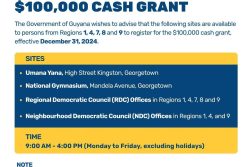Perhaps Secretary of State John Kerry’s lack of attention to Latin America might not be so bad after all — it is moving Vice President Joe Biden to get more involved with the region, and may help turn US-Latin American relations into a White House foreign policy priority.
 Biden’s six-day tour of Colombia, Trinidad and Tobago and Brazil this week has raised eyebrows in Washington. Shortly before, on May 8, Biden had delivered a speech at the State Department on the future of US-Latin American ties.
Biden’s six-day tour of Colombia, Trinidad and Tobago and Brazil this week has raised eyebrows in Washington. Shortly before, on May 8, Biden had delivered a speech at the State Department on the future of US-Latin American ties.
Kerry, who has been busy trying to broker a peace deal in the Middle East and dealing with the North Korean crisis, has not travelled to Latin America since he started his new job. (His first trip, barring last minute changes, may be for this week’s Organization of American States General Assembly in Guatemala, US officials tell me.)
Well-placed officials in Washington say that Biden’s trip to Latin America is more than a temporary substitution for Kerry, and that the vice president will become a de facto Obama administration point man for the region. Among other things, he is likely to head a cabinet-level US delegation to Mexico in the fall, they say.
It is not unusual for US administrations to separate foreign policy responsibilities in a way that other officials take charge of ties with Latin America, while the Secretary of State deals with crises in other parts of the world.
During the George W Bush administration, then Secretary of Commerce Carlos Gutierrez handled many hemispheric issues. The Clinton administration had a special envoy for Latin America — former White House chief of staff Mack McLarty — who was Clinton’s point man for the region. None of them, however, had Biden’s vice-presidential rank.
Biden is no Latin America expert but he knows the region well. He had made three previous trips to the region as vice president, including two to Mexico in 2012 and one to Chile and Costa Rica in 2009, and had visited Latin American countries often during his more than three decades in the Senate.
“When Biden was in the Senate, he was vocal on Colombia, on Cuba and on trade issues with the region,” says Carl Meacham, director of the Americas program at Washington’s Center for Strategic and International Studies. “He showed more interest in the region than Kerry, and more than the average for senators.”
Meacham, like many other Latin America watchers in Washington, believes that Biden’s greater activism on hemispheric issues is a welcome development, and reflects a greater interest by the Obama administration in the region.
In addition to President Barack Obama’s trip to Mexico and Costa Rica in early May and Biden’s trip to the region this week, the presidents of Chile and Peru are scheduled to meet with Obama in Washington on Tuesday and June 11, respectively.
And Biden announced Wednesday that Brazilian President Dilma Rousseff is scheduled to make the first state visit by a Brazilian leader to Washington in nearly two decades in October. It will be the only official state visit — it comes with week-long official celebrations — by a foreign leader to Washington this year, he said.
“It seems that the administration is taking a more active role in the region recently,” Meacham says. “There isn’t a big thing that would define the Obama administration as a transformational one as it relates to the region, but including the vice president is a good thing, that may help make it a priority.”
Eric Farnsworth, head of the Washington office of the Council of the Americas, a New York-based business-centered group, says that Biden may play a key role in US-Latin American ties not only because he is in the White House, close to the president and has close connections in Congress, but also because he is believed to be a leading presidential hopeful for 2016.
“The fact that the vice president is somebody who may run for president in 2016 is very important politically,” Farnsworth told me. “When he meets with foreign leaders, they see him in a different context because he is a potential president.”
My opinion: The fact that Biden has become actively interested in improving ties with Latin America is good news, but the big question is whether this will result in something more tangible than political tourism.
The Obama administration has not yet presented any grand plan for deepening economic ties with Latin America, as he it has done with ambitious proposals for a Trans-Pacific Partnership and a Trans-Atlantic free trade deal.
Will Biden’s higher profile in hemispheric affairs lead to a plan for a Trans-American Partnership? Will it help materialize a long-delayed US-Brazil tax treaty to eliminate double taxation? Will it help produce a Pan-American energy partnership?
It’s too early to know. But this is the time when it could happen — early in Obama’s second term, before his administration is on its way out. Biden is ideally positioned to push for it within the White House.
© The Miami Herald, 2013. Distributed by Knight Ridder/Tribune Media Services.





